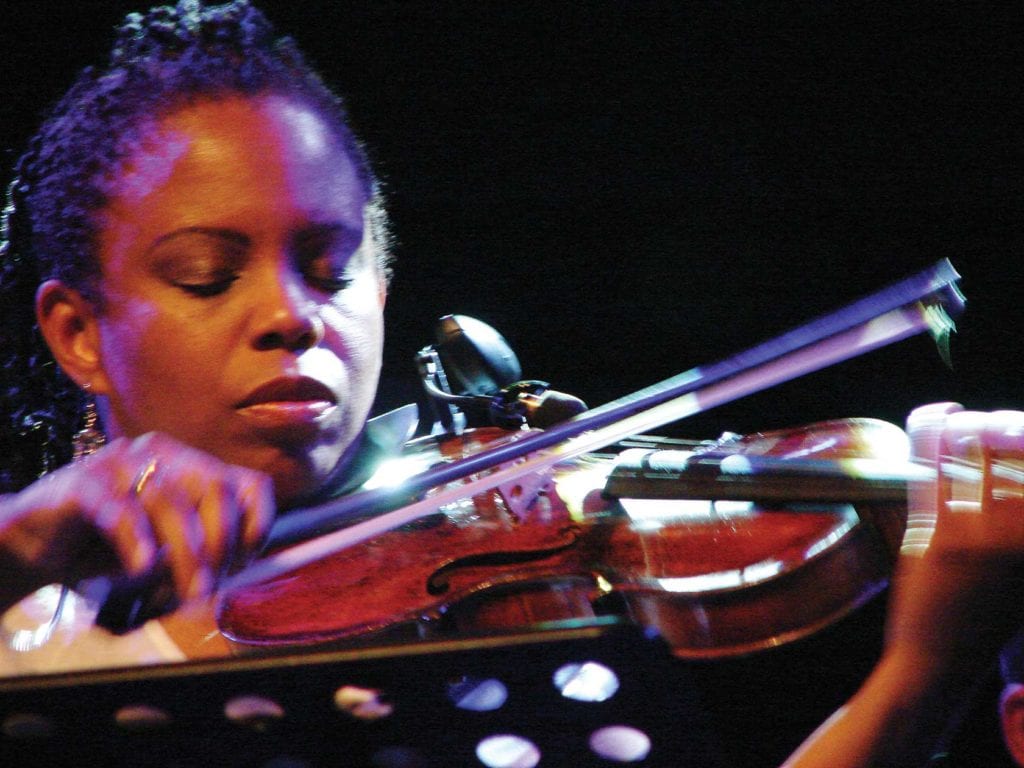
Regina Carter is back in town.
The jazz violinist, who studied at New England Conservatory for two years in the early 1980s, returns to Scullers jazz club in Allston on Friday, April 5 for one show only at 8 p.m.
Carter’s recordings show enormous range, from her most recent CD of songs made famous by Ella Fitzgerald to Latin jazz with Eddie Palmieri to “Reverse Threads,” which was inspired by African melodies, including those from the Ugandan-Jewish community.
Carter spoke with the Banner from her home in New Jersey.
Banner: Why jazz?
Regina Carter: I grew up with European classical music. And my first teacher, who taught the Suzuki method, would often tell my mother that for me, as an African American, to get work in an orchestra … It isn’t going to happen. This was the ’60s. That was my dream. It wasn’t until I was at Cass Tech, in Detroit, where I grew up, that I first heard jazz — my best friend turned me on to jazz violinists. I thought, ‘You can do this with the violin?’ Jazz provided me with the opportunity to insert what I was feeling into the music. There’s a foundation to it, but you also get to interpret. That’s what jazz is to me—that’s what drew me to the music. That and the groove. More than European classical music.
In 2018, you were named the artistic director of the New Jersey Performing Arts All-Female Jazz Residency, which is described on your website as “a summer immersion program for aspiring women jazz professionals.” Tell me about that.
Jazz pianist Geri Allen started this program, and we lost her way too soon — she passed away in 2017. So they called me to continue. We had an array of talented girls, and it was a very positive and uplifting experience. I brought in managers to teach them about the business and how to get gigs. We learned how to deal with negativity. It wasn’t just a #MeToo moment. It was a chance for all of us to work together: How do you deal with a professor hitting on you? Or people being nasty or talking down to you because they feel threatened by your talent? We offer support.
Your latest CD, released in 2017, is “Ella Fitzgerald: Accentuate the Positive.” How did you decide which songs to choose from the hundreds made famous by Ella?
That was the big question. I knew that many musicians would be putting out recordings in honor of her 100th birthday. I didn’t want to do the same tunes, like “How High is the Moon” or “A-Tisket, A-Tasket.” She sang such a broad range of songs, from country & western to doo-wop to soul. I chose songs that weren’t famous — like a “B-side” album. And because the songs I chose weren’t famous, that gave me the permission to play with the arrangements. Charenee Wade and Ray Angry did some of these arrangements. I didn’t feel boxed in.
You are so open to music. How did your recording “Reverse Threads,” released in 2010, come about?
Growing up in Detroit, I was exposed to a lot of different cultures early on. For example, the city has the largest Chaldean community in the United States. The Middle East scale system also appeals greatly to me. And I did a lot of research at the International Music Institute in New York. Then someone handed me a recording of music by Ugandan Jews — I didn’t even know! It ended up being a tree branch with a bunch of limbs and led me on this beautiful journey.
Among performers now, across musical genres, who do you enjoy listening to these days?
Right now, I’m so excited by Camille Thurmon, she’s a young saxophonist in Wynton Marsalis’ orchestra at Lincoln Center. And she sings beautifully as well. I also enjoy Jazzmeia Horn, a great vocalist. Another saxophonist I listen to is Lakecia Benjamin.
What are your current projects?
I love Afro-Cuban music, that’s something I’m working on. And my other passion is that I’m a hospice volunteer — I’m working on music, sacred and non-sacred, that celebrates life and that state of transitioning.
May I ask: What makes playing in Boston unique?
I went to school here for two years at New England Conservatory, so automatically I get sucked back in when I’m here. The memories come back, it all feels very familiar. And there are so many music students. I think of Boston as a music town.






